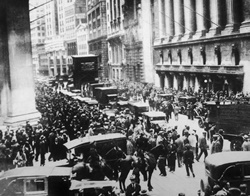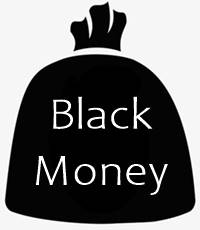
Table of Contents
What is Black Tuesday?
The stock Market crash that occurred on October 29, 1929, is defined as Black Tuesday. The stock market plunged sharply, with the Dow Jones Industrial Average (DJIA) suffering the downturn's effects in heavy trading volume.

The DJIA fell 12% in one day, making it one of the most significant one-day declines in stock market history. The panic sell-off of more than 16 million shares, which ultimately ended the prosperous twenties and brought the world Economy into the great depression
Background of Black Tuesday
The stock exchange in the United States collapsed on October 29, 1929, in an event known as Black Tuesday. This triggered a cycle of events that resulted in the Great Depression, a 10-year economic downturn that affected all developed nations.
In the United States of America, the 1920s were a period of prosperity and wealth, with stock markets reaching unparalleled heights. As a result, many investors were led to believe that the economy will continue to grow. Borrowing Capital to purchase more stocks was a common practice among investors. In the late 1920s, the stock market declined as Real Estate prices fell. As stock prices began to fall on October 29, investors hurried to sell their holdings and exit the market, driving prices much lower. This phase resulted in more and more "panic selling" before the stock price reached an all-time low.
Talk to our investment specialist
Causes of Black Tuesday
- The long period of speculation that followed the 1929 Wall Street crash was the primary cause. Millions of people spent their wealth or lent money to purchase stocks, driving markets to unsustainable heights.
- There was an increase in the interest rates by the Federal Reserve in August 1929, which reduced the liquidity to businesses. As a result, companies started laying off employees, marking a vicious downward Economic Cycle.
- On September 20, London stocks dropped after top investor Clarence Harty was sentenced to prison for fraud.
- In 1929, people started avoiding buying houses and automobiles because of the high debt. The economy began to slow down, which contributed to gradual declines in stock prices in September and October, eventually leading investors to panic.
Statistics of Black Tuesday
Here is some statistical information that will help you understand the stock market fluctuations during that time frame.
| Day | Date | Open | Close | % Change | Shares Traded |
|---|---|---|---|---|---|
| Black Thursday | 24.10.1929 | 305.85 | 299.47 | -2% | 12,894,650 |
| Friday | 25.10.1929 | 299.47 | 301.22 | 1% | 6,000,000 |
| Saturday | 26.10.1929 | 301.22 | 298.97 | -1% | |
| Black Monday | 28.10.1929 | 298.97 | 260.64 | -13% | 9,250,000 |
| Black Tuesday | 29.10.1929 | 260.64 | 230.07 | -12% | 16,410,000 |
Consequences of Black Tuesday
Not only did Black Tuesday have disastrous consequences for the US economy, but it also had global consequences. After the stock market collapsed, the Great Depression began ending an era of economic expansion and prosperity. In the United States and Europe, Black Tuesday caused a series of disastrous macroeconomic developments, including mass bankruptcies, unemployment, and drastic productivity declines.
All efforts have been made to ensure the information provided here is accurate. However, no guarantees are made regarding correctness of data. Please verify with scheme information document before making any investment.









